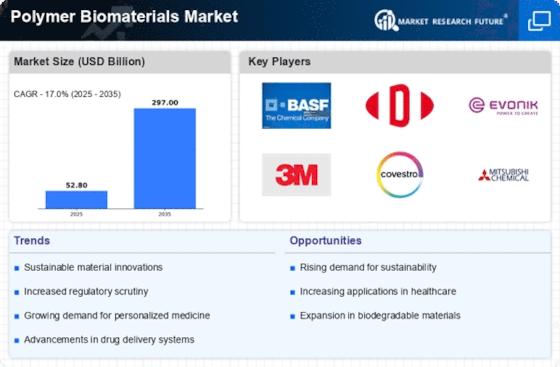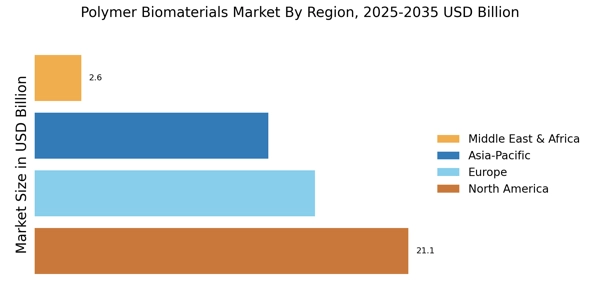Sustainable Innovations
The Polymer Biomaterials Market is experiencing a notable shift towards sustainability, driven by increasing environmental awareness among consumers and manufacturers. Innovations in biodegradable and bio-based polymers are gaining traction, as they offer eco-friendly alternatives to traditional materials. This shift is not merely a trend; it reflects a broader commitment to reducing plastic waste and carbon footprints. According to recent estimates, the market for biodegradable polymers is projected to grow significantly, potentially reaching a valuation of several billion dollars by the end of the decade. Companies are investing in research and development to create materials that not only meet performance standards but also align with sustainability goals. This focus on sustainable innovations is likely to reshape the Polymer Biomaterials Market, fostering a competitive landscape where eco-conscious products gain preference.
Technological Advancements
Technological advancements are a driving force in the Polymer Biomaterials Market, enabling the development of new materials and applications. Innovations in polymer synthesis, processing techniques, and characterization methods are enhancing the performance and functionality of biomaterials. For example, 3D printing technology is revolutionizing the production of customized implants and prosthetics, allowing for precise tailoring to individual patient needs. Additionally, advancements in nanotechnology are facilitating the creation of smart biomaterials that respond to environmental stimuli, opening new avenues for drug delivery and tissue engineering. Market analysts suggest that the integration of these technologies could lead to a substantial increase in market size, potentially exceeding several billion dollars in the next few years. As these advancements continue to unfold, the Polymer Biomaterials Market is likely to witness transformative changes that redefine its landscape.
Advanced Applications in Medicine
The Polymer Biomaterials Market is witnessing a surge in advanced applications within the medical field, particularly in drug delivery systems, tissue engineering, and regenerative medicine. The versatility of polymer biomaterials allows for the development of tailored solutions that enhance therapeutic efficacy and patient outcomes. For instance, hydrogels and nanofibers are being utilized to create scaffolds that support cell growth and tissue regeneration. Market data indicates that the demand for polymer-based medical devices is on the rise, with projections suggesting a compound annual growth rate of over 10% in the coming years. This growth is fueled by the increasing prevalence of chronic diseases and the need for innovative treatment options. As research continues to unveil new applications, the Polymer Biomaterials Market is poised for substantial expansion, driven by the intersection of technology and healthcare.
Regulatory Support and Collaboration
The Polymer Biomaterials Market benefits from a robust framework of regulatory support and collaboration among stakeholders. Regulatory bodies are increasingly recognizing the importance of polymer biomaterials in various applications, leading to streamlined approval processes for new products. This supportive environment encourages innovation and investment in research and development. Furthermore, collaborations between academic institutions, industry players, and regulatory agencies are fostering knowledge exchange and accelerating the commercialization of novel biomaterials. The establishment of guidelines and standards for the safe use of these materials is crucial for building consumer trust and ensuring market growth. As the Polymer Biomaterials Market evolves, the synergy between regulation and collaboration is likely to play a pivotal role in shaping its future trajectory.
Rising Demand in the Packaging Sector
The Polymer Biomaterials Market is experiencing a rising demand in the packaging sector, driven by the need for sustainable and functional packaging solutions. As consumers become more environmentally conscious, there is a growing preference for biodegradable and compostable packaging materials. This trend is prompting manufacturers to explore polymer biomaterials that offer both performance and sustainability. Market data indicates that the biodegradable packaging segment is expected to witness significant growth, with projections suggesting a compound annual growth rate of over 15% in the coming years. This shift not only addresses environmental concerns but also aligns with regulatory pressures to reduce plastic waste. As companies innovate to meet these demands, the Polymer Biomaterials Market is likely to expand, creating new opportunities for growth and development.

















